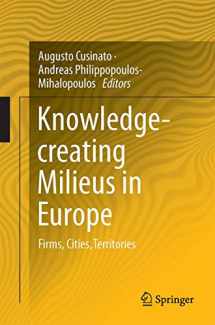
Knowledge-creating Milieus in Europe: Firms, Cities, Territories
ISBN-13:
9783642451720
ISBN-10:
3642451721
Edition:
1st ed. 2016
Author:
Andreas Philippopoulos-Mihalopoulos, Augusto Cusinato
Publication date:
2015
Publisher:
Springer
Format:
Hardcover
424 pages
FREE US shipping
Book details
ISBN-13:
9783642451720
ISBN-10:
3642451721
Edition:
1st ed. 2016
Author:
Andreas Philippopoulos-Mihalopoulos, Augusto Cusinato
Publication date:
2015
Publisher:
Springer
Format:
Hardcover
424 pages
Summary
Knowledge-creating Milieus in Europe: Firms, Cities, Territories (ISBN-13: 9783642451720 and ISBN-10: 3642451721), written by authors
Andreas Philippopoulos-Mihalopoulos, Augusto Cusinato, was published by Springer in 2015.
With an overall rating of 3.9 stars, it's a notable title among other
books. You can easily purchase or rent Knowledge-creating Milieus in Europe: Firms, Cities, Territories (Hardcover) from BooksRun,
along with many other new and used
books
and textbooks.
And, if you're looking to sell your copy, our current buyback offer is $0.3.
Description
This book introduces a radically spatialised approach to knowledge creation and innovation. Reflecting on an array of European urban and regional developments, it offers an updated notion of milieu as the conceptual and material space of knowledge and innovation in line with the interpretative turn in social sciences and humanities. In view of the unwillingness of mainstream economics to accommodate such a trend, the authors pursue a broadly understood hermeneutic approach that expands on the triad of knowledge-space-innovation. The book’s main findings are that space is an essential intermediary in the connection between knowledge and innovation, and that a renewed notion of milieu provides the knowledge-space-innovation triad with both an analytical basis and operational power. It also offers fresh insights into the significance and potential of the knowledge economy. A number of empirical European case studies on various scales (organisations, cities and territories) support the findings and suggest new policy directions.


We would LOVE it if you could help us and other readers by reviewing the book
Book review

Congratulations! We have received your book review.
{user}
{createdAt}
by {truncated_author}


